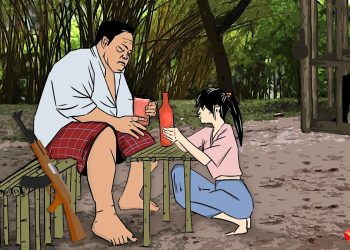RANGOON — Corruption has plagued compensation initiatives for those affected by the dual oil and gas pipelines running across Burma from the coast of Arakan State to China’s Yunnan province, a local watchdog said on Monday.
The Myanmar-China Pipeline Watch Committee (MCPWC) said it had detailed more than 100 cases of graft or other misconduct committed by local authorities in the process of compensating landowners for lost farmlands.
The group, which held a conference in Rangoon on Monday, said it had met with almost 1,000 villagers from six townships along the pipelines’ route, including farmers that had lost their land.
MCPWC said their research aimed to highlight the extent to which foreign companies investing in Burma’s lucrative extractive industries had been exploiting lax controls in the sector.
The original deal to build the pipelines was signed under the previous military junta, with the Chinese state-owned China National Petroleum Corporation (CNPC) the main operator. The Myanmar Oil and Gas Enterprise (MOGE) commands a stake in both pipelines, while South Korea’s Daewoo International has a stake in the gas pipeline.
The gas pipeline, which starts on Ramree Island in Arakan State’s Kyaukphyu Township, was opened in 2013 while the adjacent oil pipeline, which begins on Maday Island, became operational in early 2015.
The pipelines traverse through Arakan State, Magwe Division, Mandalay Division and Shan State before reaching China.
MCPWC claimed officials involved in determining land compensation claims had embezzled funds, with the group conservatively putting the amount at over 90 million kyat (US$70,000).
Zaw Aung, an independent research consultant, said authorities had in part pilfered funds by recording compensation claims against people and farmlands that didn’t exist. Some villagers also reported that the figure of compensation stated was less than the sum they actually received.
On the project’s operations, Ye Thein Oo of the MCPWC urged Burma’s government and the CNPC to make revenue statements and running costs available to the public. Despite the gas pipeline being operational since 2013, he said there was no transparency over revenue and that government officials had declined to provide accurate data when approached.
Representatives of the project’s operators also attended Monday’s symposium. Henry Zhang, deputy public relations manager of the Southeast Asia Crude Oil Pipeline (SEAOP) and the Southeast Asia Gas Pipeline (SEAGP), formed by the project’s consortium, declined to answer the watchdog’s allegations directly, saying more time was needed to examine the claims.
Zhang contended that the consortium had made donations in rural areas near the project and said Burma’s government “should take action” over any corrupt practices.
Other conference attendees raised additional concerns on Monday. Sein Myint, a retired deputy director in the Department of Mines, questioned whether the CNPC was authorized to build oil storage tanks on Maday Island and, additionally, whether the company was paying tax per gallon of oil stored, as he claimed was required by law.
Zhang offered no comment on the former bureaucrat’s charge.
MCPWC alleged that the majority of officials involved in graft worked with the Settlement and Land Records Department, the arm of government responsible for assessing land ownership and related claims. The group called on the alleged malpractice to be investigated and the perpetrators held to account.
*This article has been updated to reflect that Zaw Aung is an independent research consultant

















